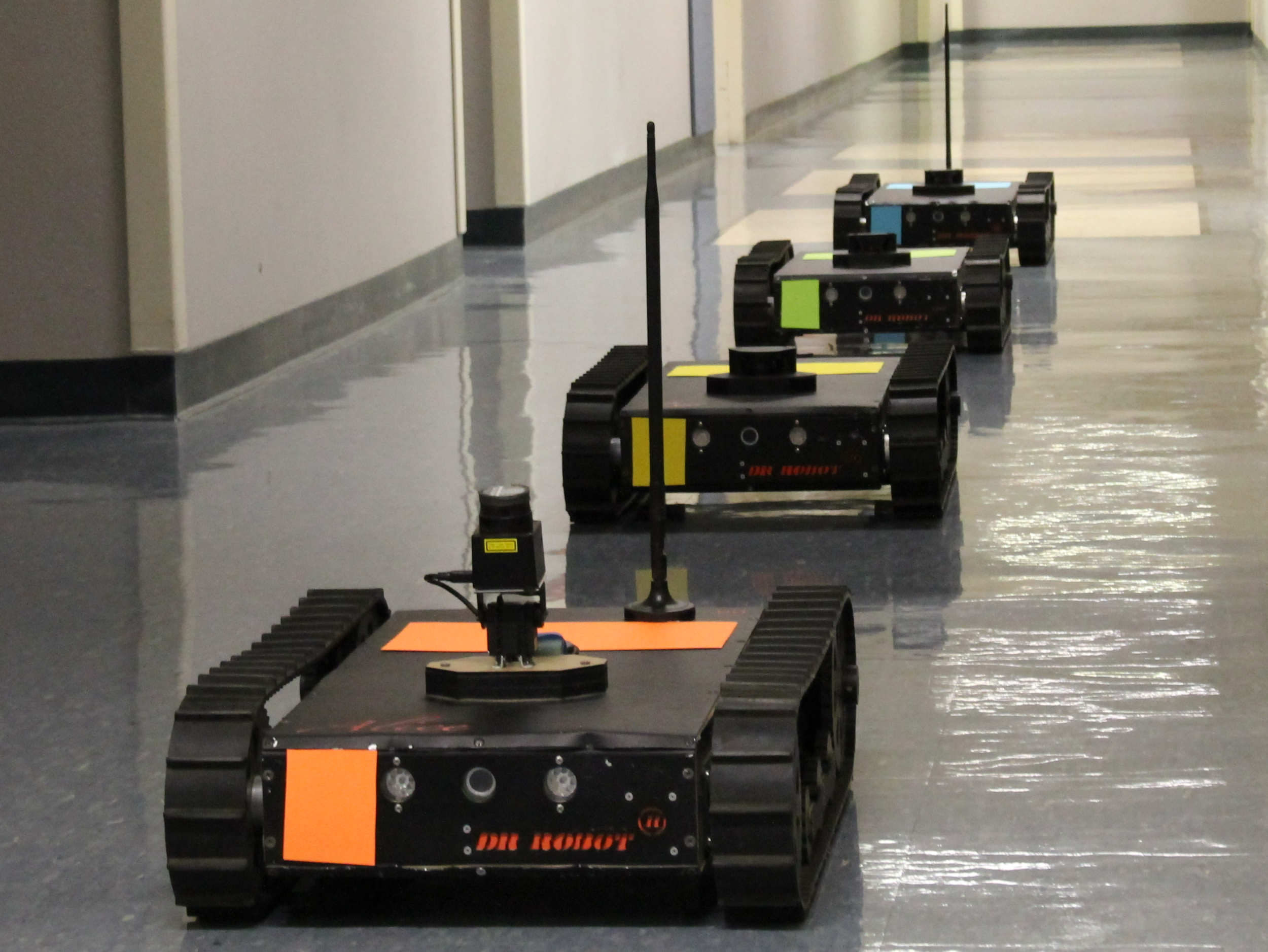About Us
The Lab for Autonomous and Intelligent Robotics (LAIR) is a research laboratory at Harvey Mudd College. Directed by Dr. Christopher Clark, research at the LAIR is focused on multi-robot systems and its applications in their field. Within these domains, topics of interest include motion planning, localization, mapping, integration of social systems, and control. Much of the lab's research involves international partnerships and expeditions. Funding for research projects originates from NSF, ONR, Cal Poly San Luis Obispo, Norwegian and Danish funding agencies.
LAIR News
LAIR Class of 2018 Moving On!
In May of 2018, several students graduated from the LAIR to move on to bigger and better things.
Alex Trudeau is joining University of Alberta as a Masters student. Kimberly Joly will be studying the intersection of Technology and Entrepeneurship as a Masters student at École Polytechnique. Zayra is joining Intel as an IoT Engineer. Jane Wu will study towards her Ph.D. at Stanford University in the Department of Computer Science. Jessica Lupanow has been awarded the NSF Fellowship and will be starting her PhD in Computer Science at USC. Eyassu Shimelis will be working at MIT Lincoln Lab as an Assistant Technical Staff. Charles Van Eijk and Aman Fatehpuria will be joining industry.
Book Chapter on Shark Tracking published!
Prof. Clark co-authored a book chapter, "Use of Autonomous Vehicles for Tracking and Surveying of Acoustically Tagged Elasmobranchs" with CSU Long Beach's Prof. Chris Lowe in Shark Research: Emerging Technologies and Applications for the Field and Laboratory.
Shark Tracking Paper Accepted to IROS 2018
The 2018 Shark Tracking team's paper "Acoustic Tag State Estimation with Unsynchronized Hydrophones on AUVs" was accepted to 2018 International Conference on Intelligent Robots (IROS) in Madrid.
Current Projects
AUTONOMOUS SHIPWRECK MAPPING
Starting Summer 2016, the LAIR has been collaborating with Cal Poly SLO and archaeologist Dr. Timmy Gambin from Malta to intelligently search and map shipwrecks using an AUV. This includes detecting shipwrecks using image processing techniques on side scan sonar data and motion-planning to map the shipwrecks.
SHARK TRACKING WITH AUTONOMOUS UNDERWATER VEHICLES (AUVs)
Partnered with CSU Long Beach Shark Lab, LAIR is developing a multi-underwater robot system capable of autonomously tracking an aggregation of sharks. The system has been tested and deployed off the coast of Catalina, California and has resulted in a total of 11 publications (4 journal articles).
MULTI-ROBOT IN CONFINED SPACES
Starting Spring 2017, LAIR has been using Genetic Programming (GP) to generate Multi-Robot Motion Planning (MRMP) algorithms. Unlike most other MRMP algorithms, the generated algorithms do not only solve individual scenarios; the generated algorithms are general enough to solve most MRMP scenarios.
MULTI-ROBOT POPULATION TRACKING
Starting Spring 2018, LAIR is collaborating with biologists from CSU Long Beach's Shark Lab to monitor and record video of animal population distributions using a mixed multi-robot system of ASVs and autonomous quadcopters. This research extends previous work by developing a novel controller for persistent environmental monitoring based on dynamic population distributions.
AUV-MAGNETOMETER SURVEYS FOR SHIPWRECKS
Starting Summer 2018, LAIR is looking to improve methods of shipwreck discovery with effective AUV-magnetometer surveys. The team has been conducting calibration and filter tests for the optimal interpretation of magnetometer data. These methods will be used in future launches to support the discovery of historical shipwrecks in Turks and Caicos.
RIVER MAPPING VIA AUTONOMOUS SURFACE VEHICLES (ASVs)
Starting June 2018, LAIR is collaborating with Caltech's geologists and Center for Autonomous System and Technologies (CAST) to develop methods to map rivers with ASV. This research includes creating water velocity and current profiles from acoustic doppler current profiler (ADCP), and using motion planning to navigate the ASV in turbulent river currents.
POLLUTION MAPPING VIA MULTI-VEHICLE SENSOR NETWORKS
Starting Summer 2017, the LAIR has been collaborating with Prof. Lelia Hawkins to develop an intelligent, mobile air quality sampling platform. This project includes work on path planning for optimal information gain and pollution state estimation using a fixed rank filter.
AUTONOMOUS LOADER
Starting Summer 2018, LAIR has been developing an autonomous track loader. This research aims to give the loader autonomous mapping and navigation capabilities, allowing it to traverse an unmapped area and avoid obstacles. These capabilities will be extended to accommodate moving obstacles.
SHIPWRECK TRAJECTORY PLANNING










